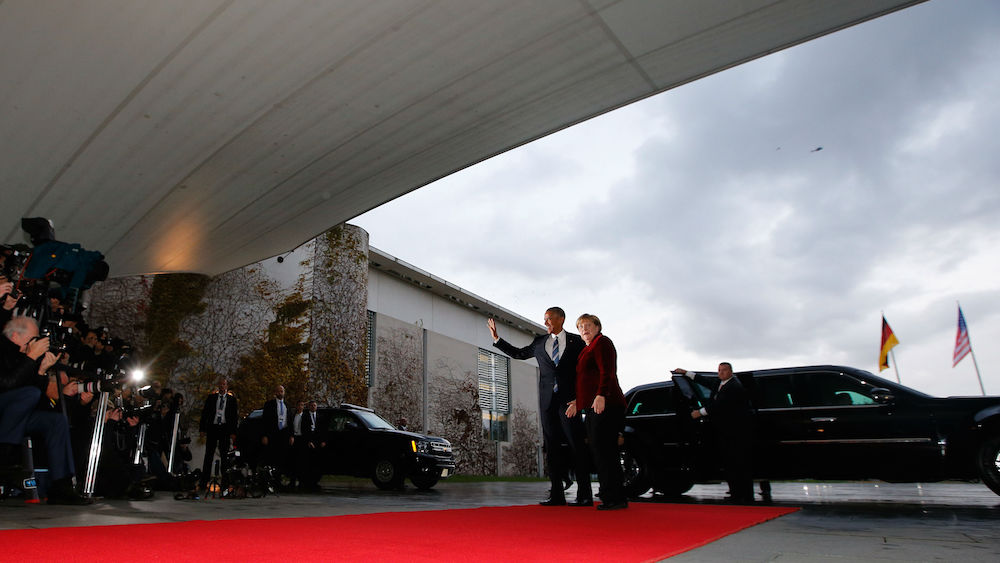Barack Obama spent an unprecedented three days in Germany’s capital to bid farewell to Angela Merkel. Both leaders strongly defended the transatlantic partnership, with the US president implicitly passing on the baton. But the German chancellor may soon feel lonely on the world stage.
Special relationships are moveable feasts, particularly in times of crisis and transition.
London has learned that twice in the last week: from the outgoing president Barack Obama and his Republican successor, Donald Trump. British Prime Minister Theresa May waited and waited for the next American president to call her after his election triumph. Eventually he got around to it – after calling many others, including a delighted Irish prime minister, Enda Kenny.
It was a diplomatic humiliation for May who, like her predecessors, talks the talk on Britain’s special relationship with the United States. Following Trump, Obama showed Downing Street who, in his eyes, walks the walk.
In the last weeks of his presidency, he spent an unprecedented three days in Berlin with his “great friend and ally” Angela Merkel. On his sixth German visit as president, the seventh in the last eight years, Obama and Merkel met three times and dined together twice, once alone in the five-star Adlon Hotel. Face-time doesn’t get any more exclusive than that.
By the time May – and the leaders of France, Italy, and Spain – were invited to join Obamerkel for brief talks on Friday morning, the European visitors would have been grateful for a cup of tea and a biscuit.
Now: Merkel has hated labels ever since she was dubbed the Pastorentochter or pastor’s daughter in East Germany. Many labels have been applied since, few have stuck. But Trump’s victory has created another, trying label for her: leader of the free/liberal/non-populist world (delete as appropriate).
All post-war German leaders have been allergic to the idea of unilateral leadership – after one prewar leader’s megalomania. But, with France, Britain, Italy, and Spain all facing their own existential crises, who else but Merkel is left to lead Europe? And, until we know if the 45th US president transitions from quasi-fascist candidate to pragmatic president, it’s clear who the 44th president is banking on.
“If I were here and I was German and I had a vote, I might support her, I don’t know if that hurts or helps,” joked Obama in a press conference on Thursday evening that stretched to an hour and beyond. In their last public appearance, the two leaders spoke and thought as one political unit, with the differences of the past – in particular US tapping of Merkel’s mobile phone – all but forgotten.
A Masterclass
Together they delivered a masterclass in high-end politics – and a passionate defense both of the transatlantic relationship and of Western values, as both are suddenly looking vulnerable.
Obama and Merkel urged the listening audiences on both sides of the Atlantic to resist the rising populists and the temptingly simple solutions they offer to the world’s complex problems. Embracing crude nationalism and allowing divisions creep into the Western alliance, Obama warned, would result in a “meaner, harsher and more troubled world.” Just how troubled a world he leaves behind was clear from the long list of unfinished business: Syria, Russia-Ukraine, climate change, the refugee crisis, and the battle against international terrorism.
For her part, Merkel picked on Obama’s warning in Athens and said more must be done to address people’s concerns about globalization, and to give the process a “human face.” Globalization critics cheered as she effectively buried the TTIP transatlantic free trade agreement – dismissed by Trump during his campaign – by vowing to “come back one day to what we have achieved.”
The two leaders’ final warning to the incoming president: do not betray Western values – or smaller countries – in pursuit of a new “convenient” relationship with Moscow on Ukraine or Syria. Merkel, who has spearheaded the icy standoff between Moscow and Kiev, vowed to “nip in the bud” any attempts to relativize national sovereignty and borders in Europe, which she dubbed the cornerstone of the continent’s most peaceful period in its history.
As President Obama said goodbye to Berlin – and Europe – on Friday, Merkel – the only world leader to see him into, and out of, office – must have struggled to suppress a feeling of dread. With pressure building on her to run for a fourth term – an announcement is likely as early as Sunday – the deeply-felt praise from Obama has made it almost impossible for her not to run again.
But, after eleven full-on years, the question now is which will run out first: Merkel’s energy to steer a world in crisis, or the partners willing to assist her, in Europe and the US. A one-woman show, even of one as indispensable as Angela Merkel, cannot conduct a special relationship with herself.







